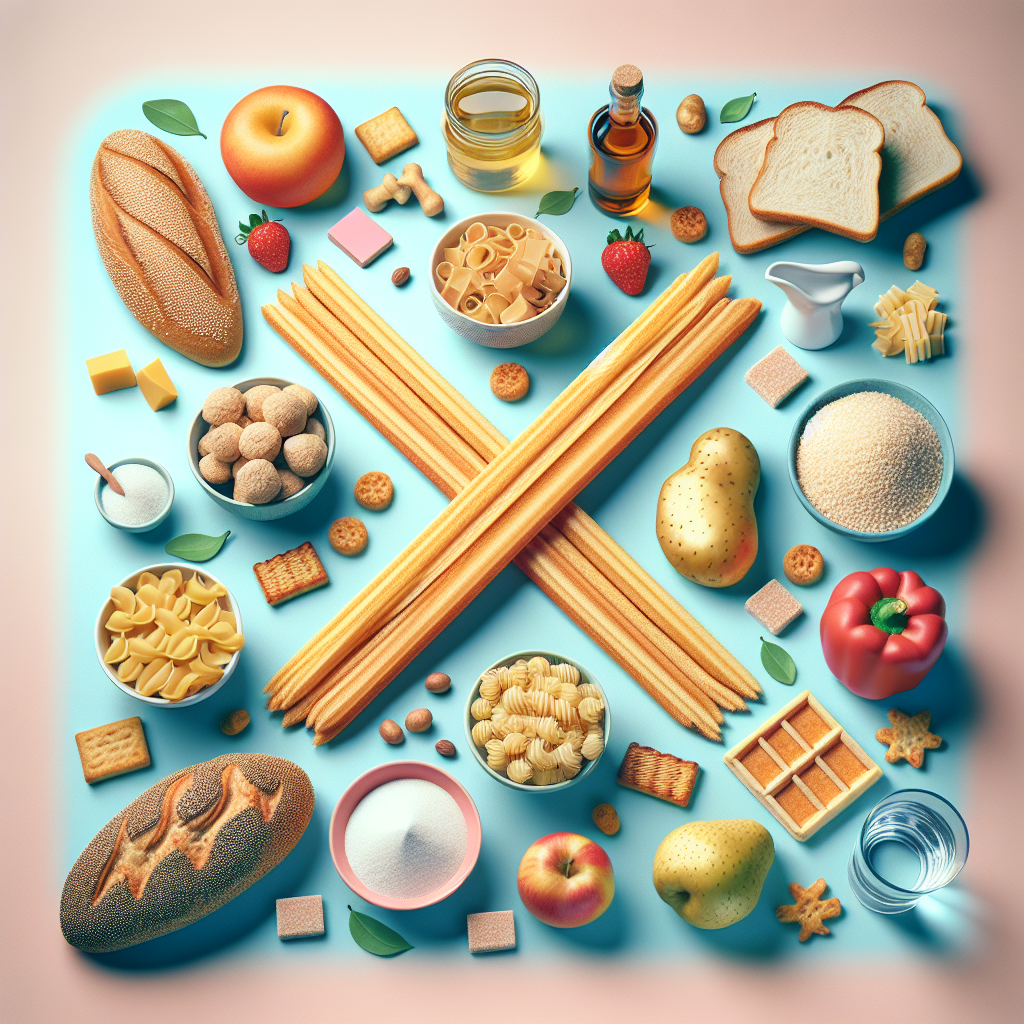Foods to Avoid When Starting a Low-Carb Diet
When embarking on a low-carb diet, the foods you choose to eliminate play a crucial role in your success. The primary focus of a low-carb diet is to reduce sugar and starches, which can lead the body to utilize fat as its primary energy source. Here’s a detailed guide on specific foods to avoid to ensure that your low-carb journey is effective and sustainable.
1. Sugary Foods and Beverages
Soda and Sweetened Beverages
Soft drinks, fruit juices, and energy drinks are laden with sugar. A standard can of soda can contain upwards of 40 grams of sugar, significantly exceeding your carbohydrate limits.
Candies and Sweets
Candy bars, gummy bears, and other sweet treats contain high amounts of sugar and refined carbohydrates that can spike your blood sugar levels.
2. Grains and Starches
Bread and Pasta
Traditional bread, pasta, and other wheat-based products are high in carbohydrates. Opting for whole grain varieties still doesn’t reduce the carb content enough to fit into most low-carb diets.
Rice and Grains
White and brown rice, along with grains like quinoa and oatmeal, contain significant carbohydrates. While they may offer some health benefits, the carb content is often too high for a low-carb diet.
3. High-Carb Vegetables
Starchy Vegetables
Certain vegetables, though healthy, are high in starch and carbs. Potatoes, corn, and peas can quickly supersede carbohydrate limits. Focus instead on low-carb vegetables like spinach, broccoli, and cauliflower.
Root Vegetables
Carrots and beets, while nutritious, also contain higher carbohydrate levels that may hinder your low-carb progress. Instead, consider non-starchy varieties.
4. Fruits High in Sugar
Berries
Though lower in sugar than many other fruits, berries can still contribute significant carbohydrates when consumed in large portions. Stick to very small quantities or consider a strict limit on portion sizes.
Bananas, Apples, and Oranges
These popular fruits are high in sugar, making them less suitable for a low-carb lifestyle. Dried fruits like raisins and apricots are even worse, with concentrated sugar content.
5. Processed and Refined Carbohydrates
Snack Foods
Chips, crackers, and pretzels often contain refined flour and added sugars, emphasizing the need to avoid these processed snacks in favor of nuts or seeds.
Baked Goods
Cakes, cookies, and pastries are not only high in sugars but also refined flours, which can derail your low-carb efforts. Look for recipes that use almond flour or coconut flour if you wish to indulge.
6. Dairy with Added Sugars
Flavored Yogurts
Greek yogurt can be beneficial, but flavored varieties often contain added sugars, increasing their carbohydrate count. Stick to plain, unsweetened yogurt and add berries if necessary.
Ice Cream and Milkshakes
These classic desserts are rich in sugar and often high in carbs. Even lower-carb ice creams can still contain more carbohydrates than you might want, so check the labels carefully.
7. Processed Meats
Breaded or Glazed Meats
Stay clear of any meats that have been breaded, glazed, or marinaded in sugary sauces. Many pre-packaged meats can contain hidden carbohydrates from sugars and fillers.
Hot Dogs and Sausages with Fillers
Some processed meats include fillers that can add unnecessary carbohydrates. Always check labels for carbohydrate content and opt for pure meats without additives.
8. Condiments and Sauces
Sugar-laden Sauces
Barbecue sauce, ketchup, and many salad dressings are often high in sugars and carbohydrates. Instead, use homemade dressings or condiments made from low-carb ingredients.
Sweet Salad Dressings
Dressings like honey mustard or sweet vinaigrettes can contain hidden sugars. It’s best to make your own dressings using olive oil, vinegar, and spices.
9. Legumes and Beans
Chickpeas, Lentils, and Beans
While often touted as healthy sources of protein, these foods are high in carbohydrates and can add up quickly, making them less than ideal for a low-carb diet.
10. Alcohol
Beer and Sweetened Cocktails
Beer is notably high in carbohydrates and can hinder progress on a low-carb diet. Sugar-laden cocktails and mixers that contain high fructose corn syrup are also significant contributors to carbohydrate intake.
Sweet Wines and Spiced Liquors
While some wines are low in carbohydrates, sweeter varieties can easily exceed your limit. Opt for dry wines or spirits while avoiding syrups and mixers.
11. High-Starch Snacks
Popcorn
Popcorn, though a whole grain, is high in carbs, particularly when consumed in larger quantities or when buttered and salted excessively. If you must snack, consider cheese crisps or nuts.
12. Packaged Foods
Convenience Meals and Dishes
Many pre-packaged meals and snacks label themselves as healthy but often contain hidden sugars and refined carbs. Always check nutritional labels carefully before consuming.
13. High-Carb Foods from Global Cuisines
Asian Noodles and Dumplings
Dishes such as ramen or dumplings are primarily made from wheat flour, therefore high in carbohydrates. Seek out alternatives that utilize zucchini noodles or cauliflower rice to stay within your carb limits.
Tortillas and Flatbreads
Corn and wheat tortillas provide a high-carb base for many meals. Consider alternatives like lettuce wraps or coconut flour tortillas for a low-carb option.
By consciously selecting your food choices and eliminating high-carb items, you’ll find it easier to maintain your low-carb diet successfully. Have fun experimenting with alternative ingredients, discovering new flavors, and ultimately achieving your health goals.
